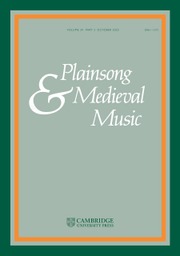Friedrich Ludwig's ‘Musicology of the Future’: a commentary and translation
Published online by Cambridge University Press: 22 October 2003
Abstract
Friedrich Ludwig's appointment in medieval music at the University of Straßburg came at a crucial time for German musicology, then a new discipline in a flourishing academic environment. Upon entering his post at Straßburg in the autumn of 1905, Ludwig delivered a formal lecture, here translated, in which he outlined the goals for twentieth-century medieval musicology. While many of these goals, in particular the editing of certain theorists and late medieval repertories, have been achieved, other directions implied in Ludwig's synthetic approach have received less attention. Ludwig's own musicology was a creative combination of forces: on the one hand, a reaction to earlier French scholarship in archaeology and philology; on the other, a borrowing of recent German trends in historiography, philosophy and music. Most notable is the influence of Ranke and Hegel on Ludwig's then new concept of latent rhythm (i.e., ‘modal rhythm’) in medieval music. A century of scholarship later, Ludwig's vision for musicology as an innovative interdisciplinary conjunction has much to teach us.
- Type
- Research Article
- Information
- Copyright
- © 2003 Cambridge University Press
Footnotes
- 3
- Cited by




